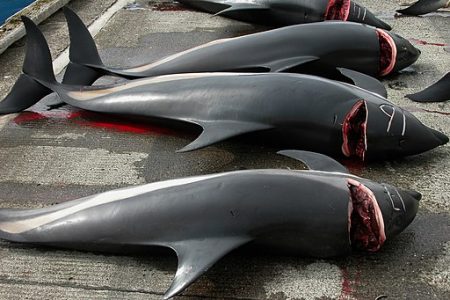
For a while now, we’ve been getting depressing reports about mass beachings of sea animals, especially mammals such as dolphins and whales. These sad stories come and go, and each time there’s a sense of futility — how can we, as individuals, do anything to solve the problems of the whales and the oceans. Sure, we could donate to another charity, but how is that really going to solve the problem? Probably it isn’t.
A more immediate remedy would be to find out what we’re doing to cause these animals to commit suicide in the first place, and then stop doing it.
To that end, I decided to watch a Netflix documentary about the state of the world’s oceans, controversially entitled “Seaspiracy.” This documentary filled me in on some cold hard reality about fishing practices, pollution, destruction of habitat, and the out and out brutality of fishermen “harvesting” and culling fish, even warm blooded creatures like dolphins and porpoises. Yes, you will see Flipper being hacked to death with large knives. (Ok, not Flipper but creatures much like her. Just a warning that this film shows a lot of blood, and is not for children or sensitive adults.)
So I watched this film and it was depressing, as you might imagine. And no, it did not give you the warm fuzzies about the fishing industry. In fact, the first thought I had after watching this film was: I can’t continue to eat fish. It just seemed abundantly clear that it’s morally wrong for me to eat seafood right now, much as I love it. And it isn’t just an ethical issue. Since the oceans are polluted, so are the fish. We’re eating a scary assortment of unhealthy minerals including mercury and arsenic in larger fish like salmon and tuna. Farmed fish tend to be unhealthy as well, but for different, more gruesome reasons.
There are an array of facts associated with this film (see https://www.seaspiracy.org/facts). Put together, they comprise an argument that is hard to argue with. It’s not about future risk — it’s about horrible things happening now. There are Catch-22s all over the place. We could just ignore the problem, but since a healthy functioning ocean is necessary to climate balance, and our climate is already dangerously unbalanced, we would be quite foolish to continue the status quo.
Here’s just one example of a dangerous imbalance (recently reported but not in the film) and it has to do with an ocean current that’s near and dear to us — the Gulf Stream. As the salinity of the Gulf Stream decreases due to glacial melting, it becomes more and more disorganized and unstable. It’s already unstable now and could, if we continue down the path we’re on, cease to operate altogether, leaving some regions in the cold and others in permanent drought. To top it off, there is an excellent chance of drastic coastal flooding throughout much of this area.
We could stop the march to catastrophe by radically reducing fossil fuel use, and that might keep the Atlantic coastlines livable… As for seafood, mitigating global warming won’t address the overfished, overexploited oceans. To do that, you need to shrink the fishing industry, which is protected in many places with subsidies. Since I care about ocean and wildlife, I’m choosing not to eat fish. If enough of us did this, it might give the so-called “fisheries” a chance to recover from decades of gluttony.
Choices. That’s what people always say. It means, “You caused this problem yourself, so make better choices and you’ll stop having the problem.” I think we’re at one of those annoying crossroads now with regard to our oceans and the aquatic life they support. The distress level in the seas is high, and we owe it to ourselves to find out why and do what we can to rectify it.
Photo credit: Erik Christensen, CC BY-SA 3.0 <https://creativecommons.org/licenses/by-sa/3.0>, via Wikimedia Commons




